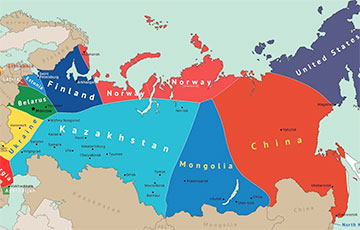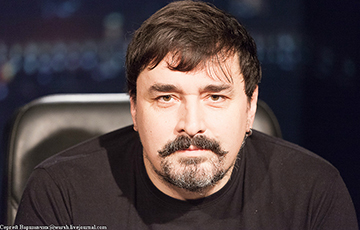Analyst At Hudson Institute: Russia Faces Insurgence And Dissolution, Belarus' Destiny Is In Euro-Atlantic Community
34- 14.01.2023, 17:34
- 45,446

Luke Coffey explained how the final collapse of the empire will happen.
Luke Coffey, a security expert at the reputable think tank Hudson Institute and former adviser to the British Ministry of Defense, published an article "Preparing for the Final Collapse of the Soviet Union and the Dissolution of the Russian Federation". The American analyst believes that Russia will disintegrate in the near future.
How will the collapse of the empire happen? Who can replace Putin? What is the future of Belarus?
Charter97.org discussed these and other issues with Luke Coffey.
Berlin Wall and the collapse of the Soviet Union being the end of the Soviet Empire, but I think, that was just the beginning of the collapse. History has the ability to condense time. And when historians write about the fall of the Soviet Union 200 years from now they will describe Russia's invasion of Ukraine in February of 2022, as the final and, perhaps, the most consequential act of this collapse.
We have been seeing collapse of the USSR since the early 1990s. You look at border fighting between Kyrgyzstan and Tajikistan, the fighting between Armenia and Azerbaijan, Russia's invasion of Georgia in 2008, Russia's annexation of Crimea in 2014, the ongoing Russian military presence on Transistria, and then Russia's large scale invasion of Ukraine last year — the Soviet Union is still collapsing.
We haven't seen what the outcome will be yet because it hasn't finished, but that's what policy makers need to prepare for.
The emergence of the 15 new countries after the fall of the Berlin Wall, I like to describe it as the safety glass shattering: like in a car windshield, the glass breaks very cleanly and neatly and safely — that was the emergence of countries like Belarus, Ukraine, Georgia, the Baltic States. When the Russian Federation shatters again, it is going to be unpredictable, very dangerous, sharp edges, in a way that was completely different from the early 1990s.
You have, for example, disproportionately many young men from ethnic minorities, fighting in the Russian Army in Ukraine, who will someday come back to their hometowns and not have much there in terms of economic prospect, future and society. You will have Russia that feels very pressured by economic sanctions. If Russia's militarily defeated in Ukraine, this will put huge pressure on the Russian elites.
You have the situation where I could see the Russian Federation not looking the same in 15 or 20 years from now as it does today on a map, because it will break up. There will be different centers of power competing over influence and control. I think, you could see possibly civil war, separatism, insurgencies, regional fighting inside Russia. We have to be prepared for this. We can't just assume that everything's just going to go on normally in Russia, because history tells us this is unlikely to be the case.
— Does Putin's aggression in Ukraine speed up this process?
— Vladimir Putin went too far with his large scale invasion of Ukraine. He thought it was going to be a very easy thing: he would replace Zelensky in a matter of days.
Ukraine (and also — Belarus) is essential in Vladimir Putin's view of Russia's role in the world. Without Russian control of Ukraine and Belarus Russia is merely an Asian power.
Vladimir Putin sees himself as being a European leader, that Russia has a role in the European community of nations, but it doesn't behave like you would expect such a country to behave.
Until February 24th of the last year, everything that Vladimir Putin did was about preserving his power and influence. Since February 24th, it's been about legacy building. He is acutely aware of his role in Russia's recent history as being the first strong leader to emerge after the end of the Cold War. He is now building his legacy for the future, and he's paying a very high price for this.
—How do you see China changing its posture as a consequences of the future collapse of Russia? Will China become a stronger adversary of the US as a result of this process?
— China would take advantage of a collapse of the Russian Federation. Russia and China have been competing against one another for influence in Central Asia and, I think, we could see that accelerate.
A key assumption on the idea that the Russian Federation could disintegrate is a Ukrainian victory. I think, a Ukrainian victory makes Taiwan safer. The Chinese government is watching how the West is supporting Ukraine to see how we might support Taiwan. If we support Ukraine to the point that leads to Ukrainian victory, I think, it would make Beijing maybe question a little bit its designs on Taiwan. In a way, Ukrainian victory against Russia could make America and its allies have a stronger position against China.
— Which kind of a politician might replace Putin in Russia or its reduced version?
— It is hopelessly naive to think that Putin's replacement is going to be some Thomas Jeffersonian democrat — nothing in recent history shows that this will be the case. Even an opposition leader Navalny — who many people in the West see as a hope for a future Russia — is a nationalist at heart, who is xenophobic and Islamophobe, who has made racist comments against the Georgian people, who supported the war against Georgia.
I just don't see much hope. I think, the West, especially the United States should recognize the limits of our influence and power to transform a country like Russia. We tried in the 1990s and we failed — we just can't do it. We shouldn't pretend that we can. We should instead focus on what we can impact and what we can influence, which is bringing those countries in Eastern Europe and Caucasus who want to be part of the Euro-Atlantic community into the family. Those countries that don't want to be part of this community, we should work to have good bilateral relations with them and and cooperate within some areas, but the idea that we can transform post-Putin Russia is naively dangerous.
— Is it worth to invest in the future Belarus?
— We should be supporting civil society in Belarus, opposition movements. We should be helping with media and communications to get the messages out of the country but also freely moving inside the country as well.
We should keep a very close eye on what Lukashenka does in the coming months regarding Ukraine. I was in Kyiv in November, and it was a question of when and not if there will be another attack on Ukraine from the territory of Belarus. The big question was if the Armed Forces of Belarus would participate. Belarus is already complicit in Russia's invasion by hosting Russian troops, basing Russian planes, helicopters and missiles. Officials in Ukraine are concerned about this they don't want to take it to another level and actually engage in combat against Belarus. The Ukrainian government has shown great restraint when it comes to Belarus
Looking into the future on how the West deals with Belarus, that will be partially determined by how Belarus acts in the coming months vis-a-vis Ukraine.
— Do Ukrainian officials you've spoke with, believe that ground Belarusian forces are likely to invade?
— They believe it's a real possibility, but they think the contribution from Belarus would be modest. When was the last time a soldier from Belarus has fired his weapon in combat? The army that they would encounter across the border in Ukraine has been doing nothing but fighting in heavy combat for the past year. It would be tragic for the people of Belarus.
A senior Ukrainian official told me that the Ukrainian border guards still maintain good communication at a local level. The messages the Ukrainian border guards are getting from their counterparts in Belarus is one of concern, of worry, not wanting to participate in another invasion of Ukraine alongside Russian forces.
We will have to see what happens, but Lukashenka is beholden to Putin, and he has a very little flexibility in terms of his decision making on these big issues.
— Speaking long term, which part of the world Belarus does belong to?
— Belarus' destiny is in the Euro-Atlantic community. The people of Belarus, especially the younger generation, want this. They look at their neighbors inside the EU and NATO, and they see economic stability, prosperity and freedom that right now they could only imagine. But I think it'll be a very long process to get Belarus to that point.
In the meantime, the US can continue working very closely with countries in the region, like Poland or Lithuania, continue engaging with opposition movements across the board in Belarus and also, perhaps, learning a bit about the fighters from Belarus that are in Ukraine fighting against Russian forces: learn what motivates them to do this, who do they see as the leaders — not with any goal of creating an army to march to Minsk, but just to have a better understanding of what we call the human terrain of opposition movements against Lukashenka.










